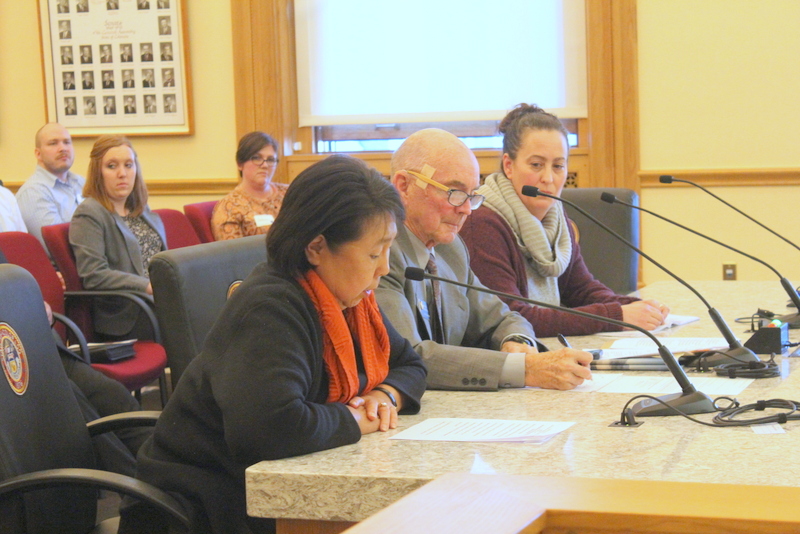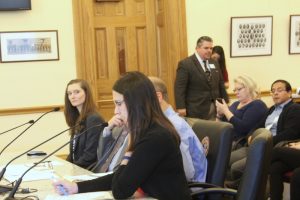 In what has become standard practice in the Senate State, Veterans, and Military Affairs Committee at the State House, an overwhelming majority in support of a bill could not persuade a Republican majority.
In what has become standard practice in the Senate State, Veterans, and Military Affairs Committee at the State House, an overwhelming majority in support of a bill could not persuade a Republican majority.
Seven people testified in favor of SB18-075 Campaign Contribution Limits School District Director which sought to establish school board campaign contribution limits under the “Fair Campaign Practices Act.” The bill was sponsored by Senator Michael Merrifield, and Representative Jeni James Arndt.
The 2017 Denver School Board race saw an unprecedented amount of contributions in terms of amount, and in terms of donor state of residency.
The lone testimony against the bill came from Ben Schler, Legal and Policy Manager in the elections division of the office of the Secretary of State. The office is headed by Secretary of State Wayne Williams.
Schler said that the bill would cause confusion in an “already confusing area of the law.” He pointed to Citizens United, the 2010 US Supreme Court decision that tied political campaign contributions to the free speech element of the First Amendment of the Constitution. That decision has since obligated courts to strike down contribution limits Schler said, “[Those] limits can survive a constitutional challenge, only if they further a sufficiently important state interest, and if the limits are closely drawn to that state interest. And as you all know well, the Supreme Court in Citizens United gave us a fairly tight definition of what that legitimate state interest is in this realm. And what Citizens United basically said was that the essential state interest that’s left when it comes to contribution limits is the interest in preventing quid pro quo corruption or its appearance.”
Senator Lois Court challenged the position of the Secretary of State’s office since statewide elected offices all have “extremely tight restrictions” embedded in the state Constitution, and as Court went on, “I don’t quite understand why the Secretary of State would object to a statutory restriction when we’re living with constitutional restrictions.”
Schler referred back to earlier court decisions and the “willingness” of the courts to side with the Citizens United unlimited contributions position, “[This] leads Secretary Williams [to] disfavor extending [those court decisions] whether it’s for school district candidates, or county candidates. It’s not necessarily about leveling the playing field which the court has spoken to on several occasions, it’s more about the fact that the courts seem to have fairly clearly told us that in this realm, we’re subject to litigation that occurs. And I think it’s also Secretary Williams’ position that contribution limits can lead to irresponsible and insignificant spending in other ways.” Schler took the position that “leveling the playing field,” leveling opportunities or equal opportunity access to financial resources did not qualify as a legitimate state interest.
Four testimonies came from former school board candidates who despite their qualifications, lost their races. All referred to their opponents’ amount of money and the source of some of those donations.
Emily Sirota who ran for the Denver School Board in 2011 said that one contributor gave a $25,000 contribution each to three candidates, yet her donations originated from those contributing small amounts.
“Campaign finance reform is critical to reclaiming our democracy from the oligarchy it’s become,” Sirota said in testimony, “Elections are supposed to be a process of citizen participation with elected officials accountable to their voters, but our democratic system has become corrupted with the influence of the big dollar contributors that play such a dominant role in our election cycles.”
Julie Bañuelos sought an at-large position on the Denver School Board in 2017. She told the committee that although she used money from her own teaching retirement fund, that she was outspent, “We really need to take into account where the big money’s coming from. Is it coming from our constituents who are actually dedicated to serving our students, or is it coming from big corporation, people that know people that have a lot of money?”
Big corporation spending was also an issue raised by Nicky Yollick who ran a Denver School Board campaign and is a current candidate for the State House in District 5, “In a Democracy, any and all elected offices should have limits on campaign contributions to keep wealthy individuals from buying influence and to provide essential legitimacy to elected officials.” Yollick documented big money in the 2017 Denver School Board race, “In recent years, wealthy organizations and individuals from outside of Colorado have poured millions of dollars into influencing our school board elections. Allowing this bill to proceed is a vital step in the process of allowing the people of Colorado to determine policy of their respective school boards, as is their right as citizens and their imperative as parents.”
Yollick read from the Secretary of State’s website:
Barbara O’Brien received 58.1% of funding in donations greater than $500 averaging $2,353.73 from 29 individuals.
Jennifer Bacon received 41% of funding in donations greater than $500 averaging $1,735.34 from 12 individuals for a total of 27,759.25 from out of state donors (37.37% of the campaign’s total funding).
Mike Johnson reported 58% of campaign funding in donations greater than $500 averaging $2,288.00 from 27 individuals.
Angela Cobian campaign received 56% of funding in donations greater than $500 averaging $2,880 from 25 individuals.
A review of contributions to Cobian from the Secretary of State website CO TRACER by The Nation Report found high-dollar contributions from Alice, Jim, and Steuart Walton, all heirs to the Walmart fortune who all reside in Arkansas. Cobian’s additional out-of-state donations totaled $33,000 which comprised 25.81% of the campaign’s funding. Cobian won her race in District 2.
“When voters feel that candidates don’t represent their interest, they don’t turn out to vote,” said Victoria Gates, who identified herself as the Denver chapter leader for Represent Us as well as the campaign director for Strengthening Democracy Colorado. Gates said that both are nonpartisan grassroots organizations focused on changing a system that currently allows candidates to run for office, citizens to vote, and elected officials to govern while in office. Gates raised concern for off-year election lack of voter turnout, “The grassroots can donate small dollars, but they feel like their speech is diminished by the influence of big money pouring into the race. With the perception of reduced impact of their free speech, small dollar donors wonder if it’s even worth to lend their voice when they feel that the system is rigged to the highest donor.”
Joy Burton who sat in the audience for another bill jumped at the chance to testify when she felt compelled after hearing previous testimony. Burton, a former high school teacher for Douglas County described an atmosphere of chaos and disruption in her and her children’s schools. She eventually had to “throw in the towel” and said that her children and other Douglas County students were the victims of a bought and paid for school board. “Seeing the outside money come in for school board candidates in Douglas County has just wreaked havoc on our district. The chaos that ensued, teachers leaving in record numbers. My own kids when they were going into Kindergarten dealing with substitute after substitute when their teacher quit the day before school started.”
The bill was defeated according to party line. JoAnn Fujioka who ran for an at-large position on school board said that she was disappointed in the vote and argued against the opposition, “It rang true that certainly [the bill] isn’t going to solve the problem in terms of making for transparency, and bringing into the light, the dark money, out of state money. But it rings false that we’re not doing anything about it. It’s fine to criticize this particular solution as having shortcomings, but then why don’t they put something forward that will address it? And I’m not seeing that at all.”
“We knew it was going to be very difficult with a Republican majority in the Senate right now,” Yollick responded after the vote, “But we’re going to keep fighting. We’re going to keep trying every year. The citizens of Colorado are starting to realize what’s been going on in our local education policy.”
The vote:
Yes:
Senator Lois Court
Senator Steve Fenberg
No:
Senator Owen Hill
Senator Vicki Marble
Senator Jerry Sonnenberg
